
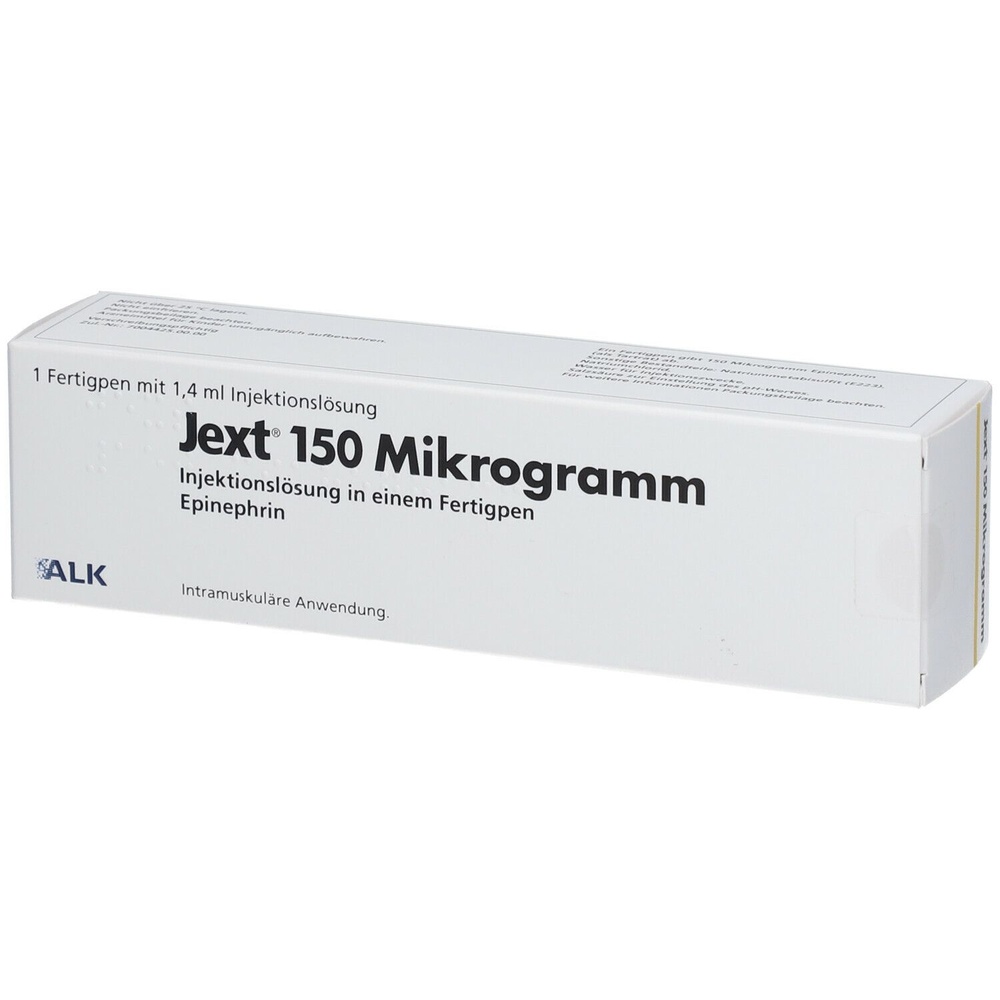
Iext

Ask a doctor about a prescription for Iext

How to use Iext
Leaflet accompanying the packaging: patient information
Jext, 150 micrograms, solution for injection in a pre-filled pen
Jext, 300 micrograms, solution for injection in a pre-filled pen
Adrenaline
Read the leaflet carefully before using the medicine, as it contains important information for the patient.
- Keep this leaflet, you may need to read it again.
- If you have any further questions, ask your doctor or pharmacist.
- This medicine has been prescribed for a specific person. Do not pass it on to others. The medicine may harm another person, even if their symptoms are the same.
- If the patient experiences any side effects, including any not listed in this leaflet, they should tell their doctor or pharmacist. See section 4.
Table of contents of the leaflet
- 1. What is Jext and what is it used for
- 2. Important information before using Jext
- 3. How to use Jext
- 4. Possible side effects
- 5. How to store Jext
- 6. Contents of the pack and other information
1. What is Jext and what is it used for
Jext contains a sterile solution of adrenaline in a pre-filled, semi-automatic pen for immediate injection of a single dose of adrenaline into the outer thigh (intramuscular injection). Jext is used for the emergency treatment of severe allergic reactions (anaphylaxis) caused by insect bites or stings, food, medicines, or physical exertion. Symptoms indicating anaphylaxis occur within minutes of exposure to the allergen and include: skin itching, raised rash (like hives), sudden facial redness, swelling of the lips, throat, tongue, hands, and feet, wheezing, hoarseness, shortness of breath, nausea, vomiting; stomach cramps and, in some cases, loss of consciousness.
2. Important information before using Jext
In the event of an acute allergic reaction, Jext can be used at any time. If the patient is allergic (hypersensitive) to sodium metabisulfite or any other ingredient of Jext, the doctor will instruct the patient on when to use Jext. For further information on hypersensitivity to sulfites, refer to the section: Jext contains sodium metabisulfite and sodium chloride.
Warnings and precautions
If the doctor has prescribed Jext to the patient, they should discuss the following with their doctor:
- if the patient has heart disease
- if the patient has hyperthyroidism
- if the patient has high blood pressure
- if the patient has diabetes
- if the patient has a pheochromocytoma (a tumor of the adrenal gland)
- if the patient has increased intraocular pressure (glaucoma)
- if the patient has severe kidney or prostate disease
- if the patient has low potassium or high calcium levels in the blood
- and/or if the patient is elderly, pregnant, or breastfeeding, or if the patient is a child under 15 kg, due to the increased risk of side effects.
If the patient has asthma, they may be at increased risk of an allergic reaction. Any patient who has experienced anaphylaxis should see a doctor to undergo tests to identify the substance they are allergic to, in order to avoid it in the future. It is essential to be aware that an allergy to one substance can lead to allergies to numerous related substances. If the patient has a food allergy, it is crucial to check all ingredients (including medications), as even small amounts can cause severe allergic reactions. The doctor or nurse will thoroughly instruct the patient on when and how to use Jext correctly. To avoid accidental injection, the patient must follow the instructions for use carefully. Jext can only be injected into the outer thigh. Do not inject into the buttocks, due to the risk of accidental injection into a vein. Warning: Accidental injection into the hand or fingers can cause blood flow to be cut off to that area. If the patient accidentally injects Jext into these areas, they should immediately go to the emergency room for treatment. If the patient has a thick layer of subcutaneous fat, there is a risk that a single dose of Jext may be insufficient. A second dose of Jext may be necessary. The patient should follow the instructions for use described in section 3. If the injection is performed by another person, and the patient's leg is not immobilized during the injection, there is a risk of injury. To avoid injury to the leg, the patient must follow the instructions for use of Jext, as described in section 3.
Jext and other medicines
The patient should tell their doctor or pharmacist about all medicines they are taking, have recently taken, or might take. This is especially important for patients taking:
- Antidepressant medicines, such as tricyclic antidepressants or monoamine oxidase inhibitors (MAOIs).
- Medicines used to treat Parkinson's disease, such as catechol-O-methyltransferase (COMT) inhibitors and levodopa.
- Medicines that increase the heart's sensitivity to arrhythmias, such as digoxin or quinidine.
- Medicines used to treat thyroid diseases (e.g., levothyroxine).
- Medicines that make breathing easier, used in asthma (theophylline).
- Medicines used during childbirth (oxytocin).
- Medicines used to treat allergies, such as diphenhydramine or chlorpheniramine (first-generation antihistamines).
- Alpha- or beta-adrenergic blockers used in heart diseases.
- Medicines that affect the parasympathetic nervous system, which regulates involuntary functions of the body, such as heart rate and lung function (parasympatholytic or parasympathomimetic medicines).
Patients with diabetes should carefully monitor their blood glucose levels after using Jext, as adrenaline may increase blood glucose levels.
Jext and alcohol
Alcohol may enhance the effects of adrenaline.
Pregnancy, breastfeeding, and fertility
If the patient is pregnant or breastfeeding, thinks they may be pregnant, or plans to have a baby, they should consult their doctor or pharmacist before using this medicine. Data on the use of adrenaline during pregnancy are limited. In life-threatening emergencies, pregnant women may use Jext without hesitation, due to the risk to their life or the life of their child. It is not expected that Jext will have any effect on breastfed infants.
Driving and using machines
It is unlikely that the administration of adrenaline by injection will affect the ability to drive or use machines, but it may be impaired due to a severe allergic reaction. In such cases, the patient should not drive. While waiting for the ambulance, the patient should lie down with their legs raised, unless this causes difficulty breathing; in such cases, they should sit down. The patient should ask someone to stay with them until the ambulance arrives, in case they feel unwell again. Unconscious patients should be placed on their side in the recovery position. The patient should inform the medical staff that they have received adrenaline by intramuscular injection. They can also hand over the used Jext for safe disposal.
Jext contains sodium metabisulfite and sodium chloride
In rare cases, sodium metabisulfite (E 223) may cause severe allergic reactions or breathing difficulties (bronchospasm). The doctor must instruct the patient on when to use Jext. This medicine contains less than 1 mmol of sodium (23 mg) per dose, which means it is considered "sodium-free".
3. How to use Jext
This medicine should always be used as directed by the doctor or pharmacist. The patient should make sure they know when to use Jext. If they are unsure, they should ask their doctor or pharmacist.
Dosage
Adults and children over 30 kg- the recommended dose in life-threatening allergic reactions is 300 micrograms of adrenaline, administered by injection into the outer thigh (intramuscular injection). Children between 15 kg and 30 kg- the recommended dose in life-threatening allergic reactions is 150 micrograms of adrenaline, administered by injection into the outer thigh (intramuscular injection). Note: The correct dose of Jext depends on the patient's weight. The dose should be increased as the child grows, and this should be discussed with the doctor. Jext should be used immediately when the patient observes symptoms of an acute allergic reaction, if necessary through clothing. After the injection, some solution remains in the Jext pen, which cannot be used again. Jext is intended for the treatment of emergencies. After using Jext, the patient should always seek medical help immediately. They should call the emergency number 112, ask for an ambulance, and report "anaphylaxis", even if the symptoms are relieved. The patient should go to the hospital for observation or further treatment if necessary, as the anaphylactic reaction may recur after some time.
Method of administration
Jext is designed to be injected through clothing or directly through the skin of the outer thigh. After pressing the pen against the thigh, a spring-loaded plunger will push the hidden needle through the protective cover at the black tip, which will puncture the muscle of the thigh and inject the dose of adrenaline. The patient should carefully follow the instructions for use below:
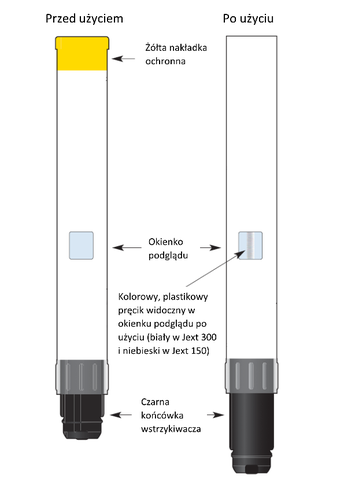
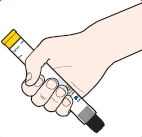 |
|
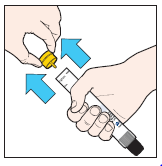 |
|
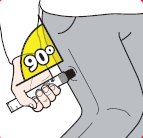 |
|
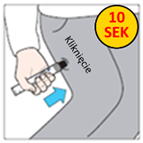 |
|
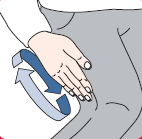 |
|
In the viewing window, there is a colored, plastic rod (white in Jext 300 and blue in Jext 150), which confirms the activation of the auto-injector and the injection of the adrenaline solution. The Jext pen may contain a small air bubble. This does not affect the effectiveness of the medicine. Although most of the solution remains in the Jext pen after use, it cannot be used again. Jext is intended for emergency use. After using Jext, the patient should always seek medical help immediately. They should call the emergency number 112, ask for an ambulance, and report "anaphylaxis", even if the symptoms are relieved. The patient should go to the hospital for observation or further treatment if necessary, as the anaphylactic reaction may recur after some time.
Overdose of Jext
In the event of an overdose of Jext or accidental injection of adrenaline, the patient should alwaysseek medical help immediately. The patient should contact their doctor as soon as possible to replace the used Jext. The patient's blood pressure may rise sharply. Overdose may lead to a sudden increase in blood pressure, irregular heart rhythm, abnormal kidney function, decreased blood flow, and fluid accumulation in the lungs. If the patient has any further questions about the use of this medicine, they should ask their doctor or pharmacist.
4. Possible side effects
Like all medicines, Jext can cause side effects, although not everybody gets them. The following side effects are based on experience with adrenaline. Frequency not known (frequency cannot be estimated from the available data):
- Tremors
- Injection site reactions, such as bruising, pain, and swelling
- Dizziness
- Fainting
- Headache
- Feeling of tingling or numbness
- Feeling of rapid or irregular heartbeat
- Muscle stiffness
- Nausea
- Vomiting
- Dry mouth
- Decreased blood flow to the hands and feet in case of accidental injection into these areas
- Increased blood pressure
- Feeling of weakness
- Excessive sweating
- Discomfort or pain in the chest
- Changes in blood test results, such as increased blood sugar levels, decreased potassium levels, and accumulation of harmful acids in the body.
Accidental injection of adrenaline into the hand or foot has been reported, which can cause blood flow to be cut off to that area, as well as coolness, paleness, tingling, numbness, bruising, painful bleeding, and swelling at the injection site. In case of accidental injection of Jext, the patient should always seek medical help immediately. Jext contains sodium metabisulfite, which may rarely cause severe hypersensitivity reactions, including breathing difficulties.
Reporting side effects
If the patient experiences any side effects, including any not listed in this leaflet, they should tell their doctor or pharmacist. Side effects can be reported directly to the Department of Drug Safety, Office for Registration of Medicinal Products, Medical Devices, and Biocidal Products, Al. Jerozolimskie 181 C, 02-222 Warsaw, tel.: +48 22 49 21 301, fax: +48 22 49 21 309, website: https://smz.ezdrowie.gov.pl. Side effects can also be reported to the marketing authorization holder. By reporting side effects, more information can be gathered on the safety of the medicine.
5. How to store Jext
The medicine should be stored out of sight and reach of children. Do not use this medicine after the expiry date stated on the label and carton after: "Expiry date (EXP)". The expiry date refers to the last day of the month. Store in a temperature below 25°C. Do not freeze.
Remember to check the contents of the Jext pen through the viewing window from time to time to ensure the solution is clear, colorless, and free of visible particles. Replace Jext before the expiry date or earlier. Do not use this medicine if the solution has changed color or has become a suspension (visible particles). It may be helpful to write the expiry date in a calendar or diary to ensure Jext is replaced at the appropriate time.
Jext is provided in a plastic case to protect the medicine during transport or storage. The patient should remove Jext from the case before use or when checking the medicine. After checking, the patient should put Jext back in the case. Medicines should not be disposed of via wastewater or household waste. The patient should ask their pharmacist how to dispose of medicines they no longer use. This will help protect the environment.
6. Contents of the pack and other information
What Jext contains
The active substance is adrenaline. 1 mL of solution contains 1 mg of adrenaline (as tartrate). One Jext 150 micrograms pen delivers 150 micrograms of adrenaline in 0.15 mL of solution for injection. One Jext 300 micrograms pen delivers 300 micrograms of adrenaline in 0.3 mL of solution for injection. The other ingredients are: sodium chloride, sodium metabisulfite (E 223), hydrochloric acid, and water for injections.
What Jext looks like and contents of the pack
Jext is a solution for injection in a pre-filled, semi-automatic pen, in a cardboard box. The pen contains a clear and colorless solution, free of visible particles, in a glass cartridge with a rubber stopper that does not contain latex. The pre-filled pen is provided in a plastic case. Needle length: Jext 150 micrograms: 13 mm, Jext 300 micrograms: 15 mm. Pack size: single pack containing 1 pre-filled, single-dose, semi-automatic pen.
Marketing authorization holder and manufacturer
Marketing authorization holder
Miguel Fleta 19, 28037 Madrid, Spain.
This medicine is authorized in the Member States of the European Economic Area and in the United Kingdom (Northern Ireland) under the following names:
| Austria, Belgium, Bulgaria, Croatia, Czech Republic, Denmark, Finland, France, Germany, Hungary, Iceland, Ireland, Italy, Lithuania, Luxembourg, Netherlands, Poland, Portugal, Norway, Romania, Slovakia, Slovenia, Spain, Sweden, United Kingdom (Northern Ireland). | Jext |
Date of last revision of the leaflet:17.08.2023
- Country of registration
- Active substance
- Prescription requiredYes
- Manufacturer
- ImporterALK-Abello A/S
- This information is for reference only and does not constitute medical advice. Always consult a licensed doctor before taking any medication. Oladoctor is not responsible for medical decisions based on this content.
- Alternatives to IextDosage form: Solution, 1 mg/10 mlActive substance: epinephrineManufacturer: Laboratoire AguettantPrescription requiredDosage form: Solution, 1 mg/mlActive substance: epinephrinePrescription requiredDosage form: Solution, 300 mcg/0.3 mlActive substance: epinephrineManufacturer: Warszawskie Zakłady Farmaceutyczne POLFA S.A.Prescription required
Alternatives to Iext in other countries
The best alternatives with the same active ingredient and therapeutic effect.
Alternative to Iext in Ukraine
Alternative to Iext in Spain
Online doctors for Iext
Discuss dosage, side effects, interactions, contraindications, and prescription renewal for Iext – subject to medical assessment and local rules.










